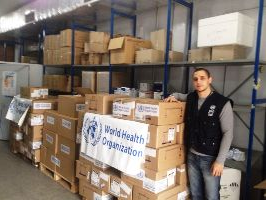 WHO staff delivering antiretroviral medications to the Ministry of Public Health Quarantina warehouseThe HIV epidemic was introduced to Lebanon in 1984, with the first diagnosed AIDS case. Since then, the number of cases have been slowly but steadily rising which led the World Health Organization (WHO) Lebanon Office, in collaboration with the Lebanese Ministry of Public Health, to form the national AIDS control programme in 1989. The programme’s main aim is to curb the HIV and AIDS epidemic, gather statistics on reported cases of HIV/AIDS, coordinate with nongovernmental organizations, ministries, media, religious leaders, UN agencies and other key stakeholders and improve the situation of people living with HIV and limit its spread in Lebanon.
WHO staff delivering antiretroviral medications to the Ministry of Public Health Quarantina warehouseThe HIV epidemic was introduced to Lebanon in 1984, with the first diagnosed AIDS case. Since then, the number of cases have been slowly but steadily rising which led the World Health Organization (WHO) Lebanon Office, in collaboration with the Lebanese Ministry of Public Health, to form the national AIDS control programme in 1989. The programme’s main aim is to curb the HIV and AIDS epidemic, gather statistics on reported cases of HIV/AIDS, coordinate with nongovernmental organizations, ministries, media, religious leaders, UN agencies and other key stakeholders and improve the situation of people living with HIV and limit its spread in Lebanon.
In the year 2011, 109 new cases of HIV/AIDS have been reported to the national AIDS programme in Lebanon. A significant number of these reported cases (72%) have been linked to local spread, whereas 28% are linked to travel and migration to endemic areas.
Distribution of cases by age shows that the higher number of reported cases to the national programme is in the age group 31–50 years old (30%), whereas cases below 30 years constitute 28% and non-specified 33%.
Gender distribution shows that 93% of the newly reported cases are among males compared to 7% for females.
The major mode of HIV transmission is by sexual relations, which represent 51% and non-specified constituted 47%. Of the total infections by sexual transmission 27.5% is through heterosexual behaviour, 22% homosexual, 0.9% bisexual and 49.6% non-specified. The vertical transmission (mother to child) of the disease is reported to be zero.
Data on high-risk groups (intravenous drug users, sex workers, prisoners), is incomplete, although the problem does exist. Blood safety is relatively well controlled in the country. No new cases of HIV infections through blood transfused in Lebanon have been reported since 1993.
By the end of November 2011, the cumulative total of HIV/AIDS cases reported to the national AIDS control programme reached 1455.
The national AIDS control programme is currently involved in several projects listed below.
Voluntary counselling and testing (VCT)
VCT is an ongoing activity whereby the programme trains health care workers and nurses from various nongovernmental organizations, health centres and clinics on VCT service delivery. These VCT workshops help to develop new capacities for VCT services, thus increasing the availability and spread of VCT centres all around Lebanon. The service offers: information and brochures about HIV/AIDS and sexually transmitted infections, pre-test counselling, testing and post-test counselling in a private anonymous setting, in addition to referral to the needed health care and social services.
Centre for the distribution of HIV/AIDS medications
As a step towards reducing stigma and discrimination associated with people living with HIV/AIDS, the programme opened a centre for the distribution of HIV/AIDS medications; a centre that is independent of the Ministry’s dispensary. The programme's dispensary team always provides a continuous follow up with the drug companies to insure continuous sustainability and availability of treatment for people living with HIV/AIDS.
National strategic plan
With support of some UN agencies such as UNICEF, the United Nations Development programme (UNDP), World Bank and the United Nations Population Fund (UNFPA), and in coordination with civil society, the national programme is currently developing a new national strategic plan to fight HIV/AIDS for the coming three years. This includes all kinds of activities from prevention, treatment, to care and support with a special focus on prevention of mother-to-child transmission and most-at-risk populations.
Awareness sessions
The national programme raises awareness and gives lectures to the young generation through lectures in schools and universities. As a part of this activity, WHO Lebanon implemented an E-learning programme. The aim of this project was to develop an e-learning CD where teachers and students can learn about HIV/AIDS, ways of transmission and treatment and to know all the information related to HIV/AIDS. WHO Lebanon along with the programme team conducted more than 100 awareness lectures in all the public schools in all the regions in Lebanon to raise awareness on HIV/AIDS. The lectures targeted health life science teachers on HIV/AIDS and staff provided them with necessary tools to introduce that topic in their school curriculum.
Our aim is increasing awareness within the community while decreasing HIV/AIDS-related stigma and discrimination, and improving the rights of people living with HIV.
Related link
Regional programme for AIDS and sexually transmitted diseases


